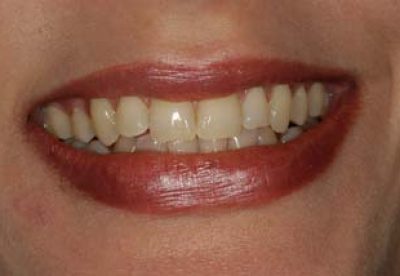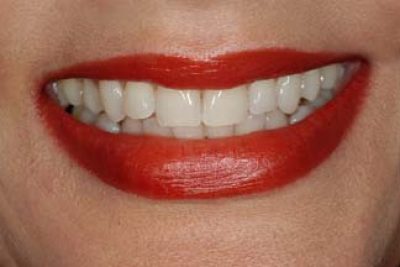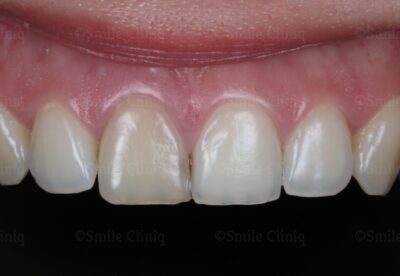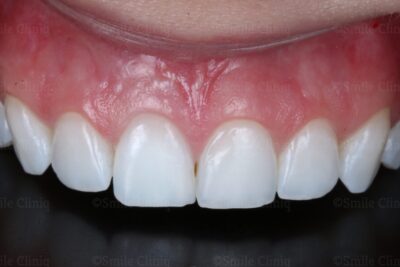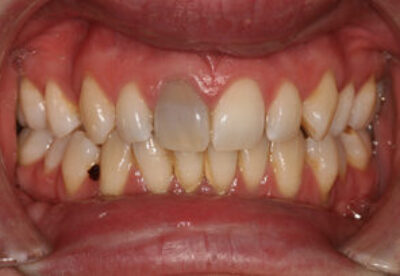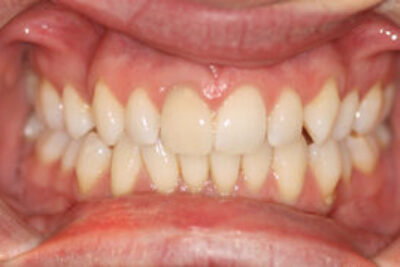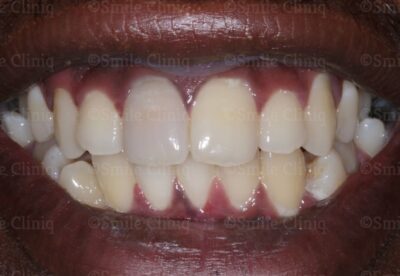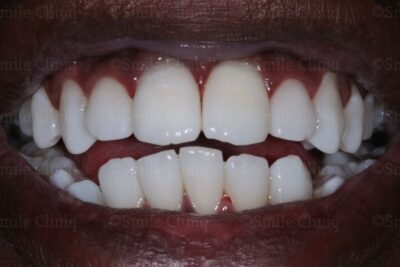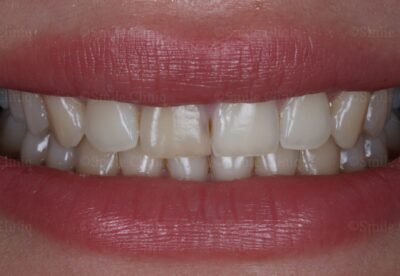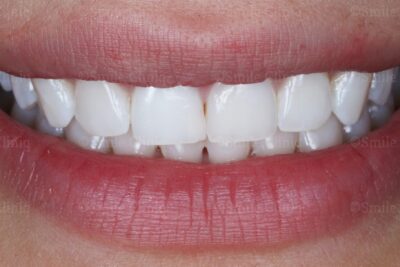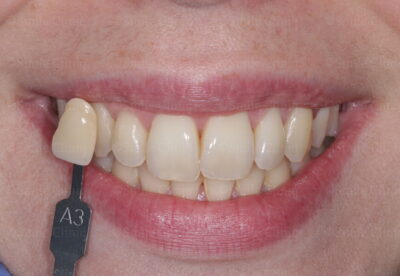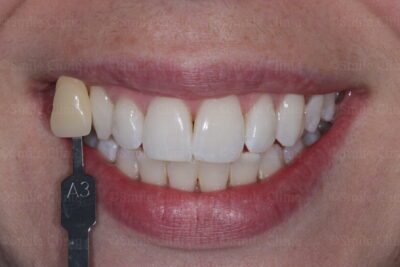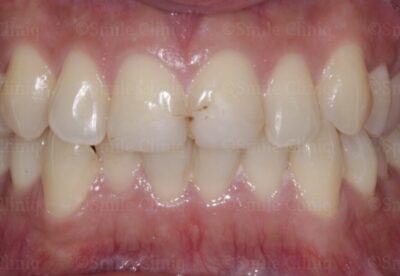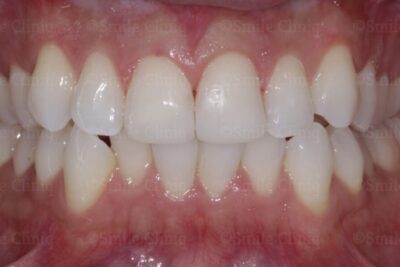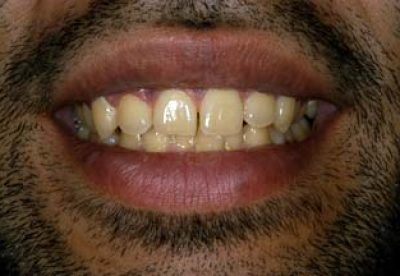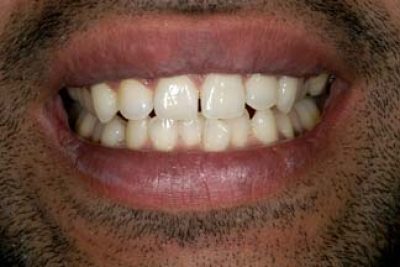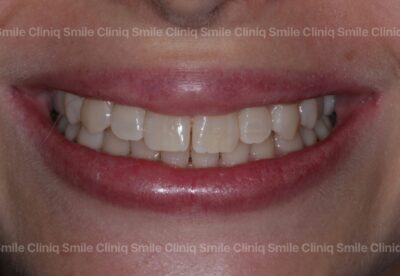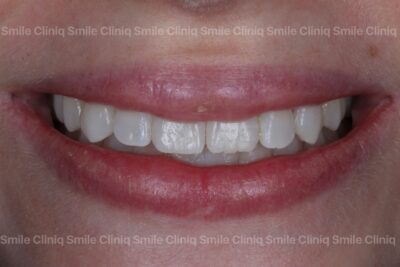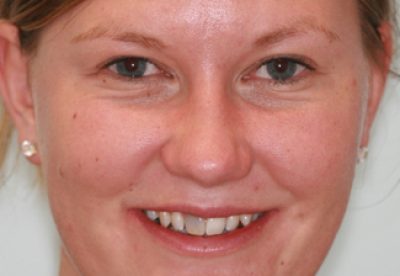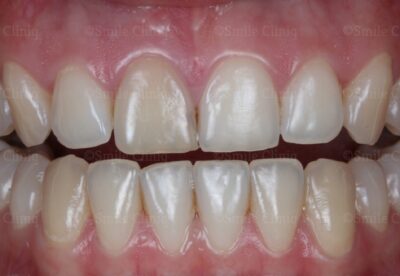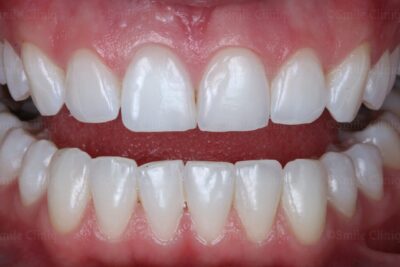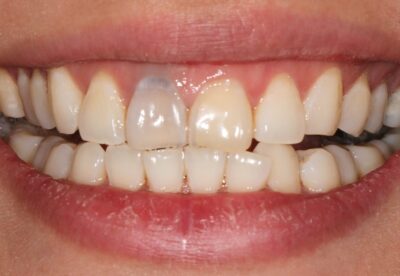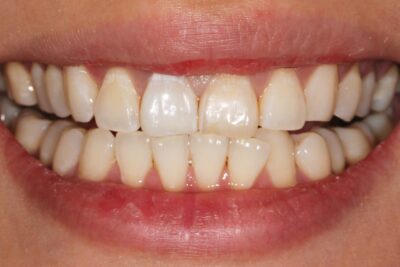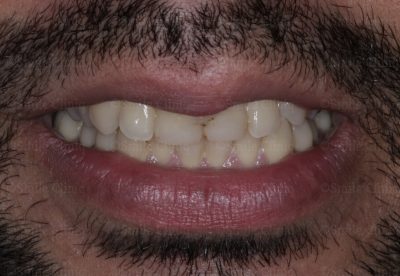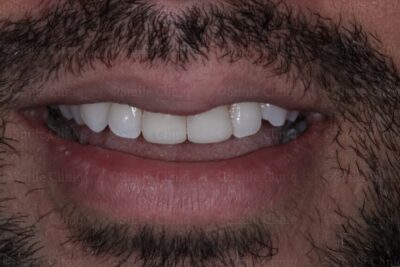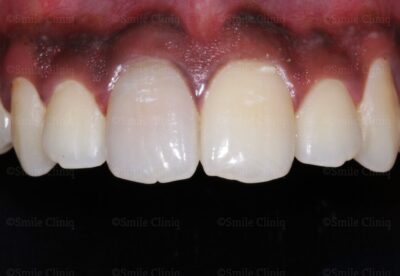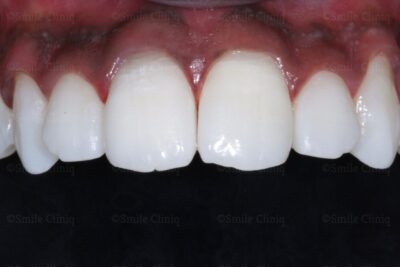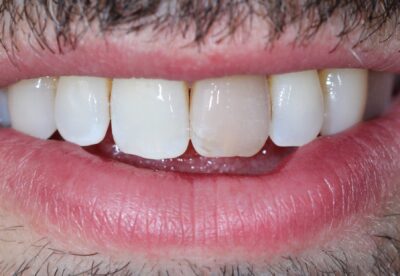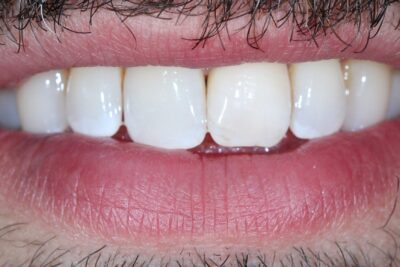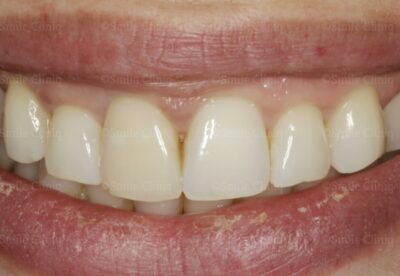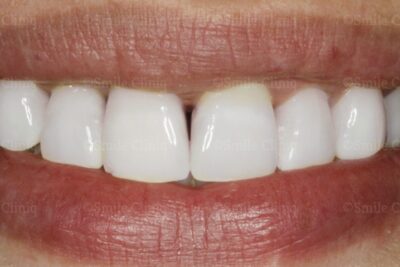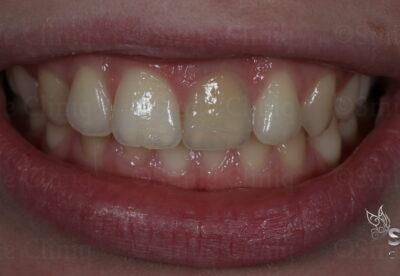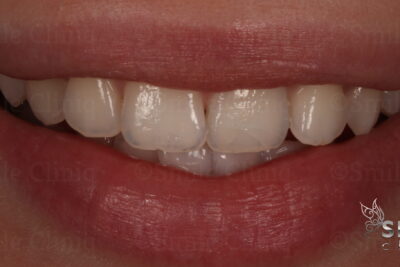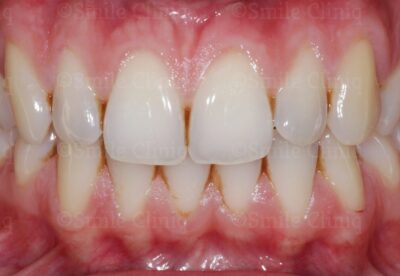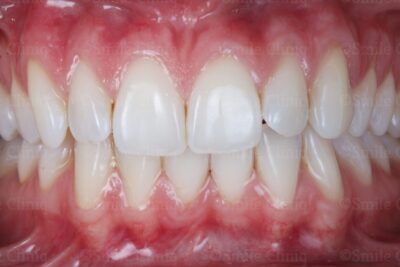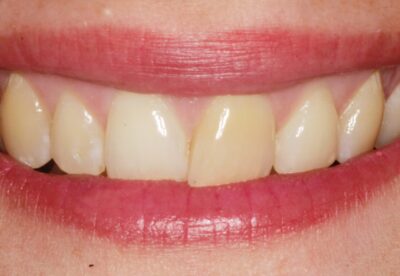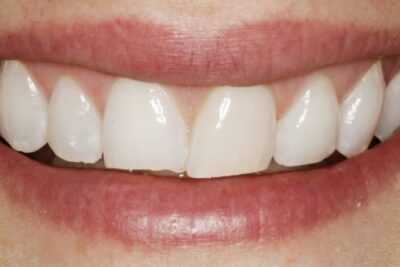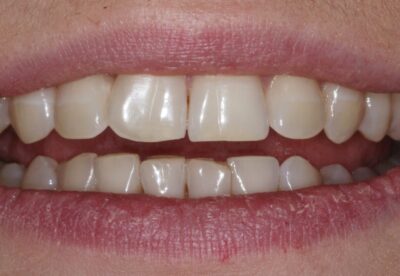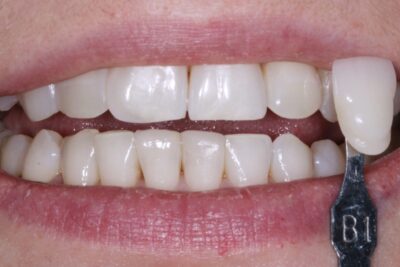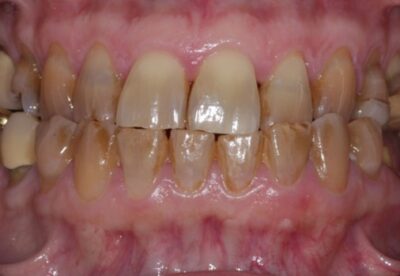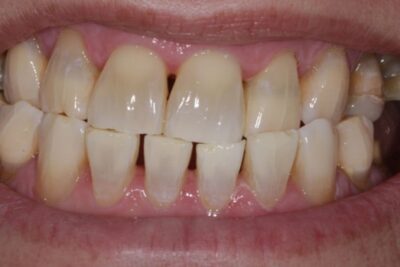Before and After Gallery
The Best Teeth Whitening in London By Smile Cliniq
Teeth whitening is the No.1 requested and performed cosmetic dental procedure in the UK. In everyday life, the microscopic pores of your teeth are pigmented with substances such as red wine, coffee and tobacco. These, in conjunction with age-related changes, can give your smile a stained and discoloured appearance. London teeth whitening, also known as teeth bleaching, lightens teeth and helps to remove stains and discolouration. It is effective in 95% of patients and even works well for dead teeth whitening.
Smile Cliniq’s best teeth whitening in London is the ideal procedure to have just before that important social occasion allowing you to have a radiant smile in all of your photos.
Smile Cliniq Teeth Whitening Dentist London Patients
Do you have stained teeth, or are you looking for dead teeth whitening? A variety of options are available today for you to brighten your smile, but teeth whitening dentist London treatments remain the safest and most effective way to a brighter whiter smile. Your dentist will conduct an initial consultation and a thorough assessment. The options for your professional teeth whitening in London appropriate to your case will then be thoroughly discussed with you to provide a customised London teeth whitening procedure.
What is London Teeth Whitening?
Teeth whitening in London is a simple technique using hydrogen peroxide to lighten the shade of your teeth. This is Smile Cliniq’s most popular procedure to dramatically improve your appearance, at significantly less cost and inconvenience than other techniques. This technique of professional teeth whitening in London is safe when carried out by our professional teeth whitening dentists London.

How Does Teeth Whitening Work?
Teeth whitening is most effective on surface stains caused by age, or pigmented foods and drinks. The whitening of your tooth occurs due to the breakdown of the peroxide gel providing highly active oxygen free radicals. These effectively break up the unattractive pigmented molecules causing the stain to be removed, providing you with a brighter whiter smile.
The lighter the stain the easier it is to whiten. The most severe discolouration (e.g. tetracycline staining) may require a longer period of active teeth whitening with subsequent veneers.
Over-the-counter systems are not on a par with Smile Cliniq-approved products used by our teeth whitening dentist in London. They differ in the type of chemical used and its active concentration. Scientific literature and research indicate that our dentist-monitored best teeth whitening in London are the most effective and safest way to lighten discoloured teeth.
If you have existing tooth-coloured restorations such as crowns or white fillings, these will not alter in shade.
Laser Teeth Whitening London
Laser teeth whitening London, also known as power whitening, is another type of teeth whitening system that a dentist can provide. A bleaching product is painted onto your teeth and then a light or laser is shone on them to activate the whitening. Laser teeth whitening London takes about an hour. You can find laser teeth whitening London prices on our fees page.
How white will my teeth get?
The difference you want to see in your teeth whitening before and after is your choice. Generally, the longer you bleach your teeth the whiter they become. In today’s cosmetic-conscious society, shades accepted in the past have been superseded by the pearlescent whites that people now accept as normal. The general dental consensus is the shade of the teeth should match the whiteness of a person’s eye.
How about whitening toothpaste?
These generally contain too little of any active London teeth whitening material to provide a true whitening result. Instead, the product is likely to contain an abrasive material, which physically removes layers of your tooth. This gives an apparent whiter tooth but with a dull appearance.
The Teeth Whitening Dentist Procedure
A preoperative shade of your teeth is taken prior to commencing any Teeth whitening procedure. Once your treatment is complete, a post-operative shade is taken. Depending on the location, we may be able to offer professional photography to show you at your best. This also allows you to see the full teeth whitening before and after the difference.
White Teeth at Home
For the best teeth whitening in London, Smile Cliniq offers this commonly prescribed cosmetic dental procedure in two clinically proven and safe systems: at-home teeth whitening and a fast, professional service at our teeth whitening dentist in London.
Custom Home Teeth Whitening
On your initial visit to the London Smile Cliniq dental practice, your dentist will take an impression (mould) of your teeth. From this, a customised tray is made to snugly fit to your teeth. These trays ensure that there is minimal leakage and maximum cosmetic effect.
Once constructed the trays will be checked for accuracy of fit and specific instructions will be provided on your tooth-whitening regime. Customised trays are loaded with the easily applicable peroxide gel and worn for between 2 and 4 hours for several days.
A brief visit after active treatment to your dentist ensures that a London teeth whitening effect has occurred and that you are pleased with your result.
Power Tooth Bleaching: In-House Teeth Whitening Dentist
Our in-house teeth whitening dentist in London treatments are carried out by one of our dentists at the Smile Cliniq dental practice. This system is perfect for those who want an instant result. These professional teeth whitening in London uses state-of-the-art equipment to whiten and brighten your smile by up to 8 shades in only 60 minutes.
Your teeth may be professionally polished to ensure the optimal efficacy of the teeth whitening procedure. Your dentist protects your gums and surrounding tissues with a barrier membrane. The active teeth whitening agent is then applied to your teeth. A light shined onto the teeth whitening gel to allow the maximum activity of the carbamide peroxide. The teeth whitening London gel is replaced several times during the procedure to give optimal teeth whitening before and after results.
Once the treatment period is completed, your dentist will show you how many shades your teeth have changed so you can appreciate the full effects of your teeth whitening before and after.
Occasionally a combination of the two above treatment types may be used to ensure optimal results and whiter teeth.
Teeth Whitening Expectations
Significant whitening can be achieved in many cases, but there is no absolute way to predict how light your teeth will get. Exact results are not guaranteed. Teeth with multiple colourations, bands or spots due to tetracycline staining or fluorosis do not whiten as well and may appear more spotted after treatment. These may require further treatment to achieve a uniform result in the form of veneers. A patchy appearance of teeth with white spots may occur after whitening, this usually blends in after a few weeks.
Alternatives to Teeth Whitening Dentist Approved
Scale and polish or air abrasion can improve tooth colour by removing surface staining. This may not be as effective for dead teeth whitening. Crowns and veneers can change the shade as well as the shape of the teeth, however, they involve shaving part of the tooth away and replacing it with porcelain.
Dead Teeth Whitening Success Story
“I injured my front tooth when I was about 10 years old in primary school. I ran into one of my taller, much bigger classmates!! I was taken to the dentist almost immediately after it happened as my lip was massively swollen, however, there was too much swelling to see the full extent of the damage, but the dentist suspected I had killed the nerve and would need a root canal.
A few weeks later I had the root canal done. My front tooth began discolouring a few days after the accident and continued to get darker until it became a very noticeable dark grey colour. At the time it didn’t really bother me as I was so young. It was only in later years when I was about 15 years old that it really started to bother me, especially when I got my braces off which made the darkened tooth even more noticeable, as up to this it was partially covered by the brace itself.
I had had internal bleaching done on the tooth when I was about 13 years old and on holiday in New York, as my mum’s friend is a dentist there. The results were good but as I was only able to make it to 2 out of the 3 recommended sessions, the tooth began to discolour again within a few years. When I was around 17 years old, I had more treatment, this time a whitening kit that I used at home for 2 weeks. The results of this were good but not perfect and again this only lasted a few years.
In recent years, the discolouration of my front tooth has really bothered me and is something I particularly noticed in photographs. It was the first thing my eye was drawn to anytime I saw a photograph of myself. Thanks to years of Orthodontics I finally have nice straight teeth that I’m delighted with and take very good care of, however, all of this I felt was overshadowed by my grey front tooth. It made me very self-conscious and paranoid about my smile, despite the fact that the rest of my teeth were healthy.
The results from the internal bleaching treatment carried out by Dr Chetan and his colleagues have been amazing. There has been a massive improvement in the colour of my front tooth and I no longer notice it in pictures. I’m delighted with the results and definitely would recommend this procedure to anyone with the same problem as me, who like me does not want to go down the road of a crown or veneer.
Many thanks to Dr Chetan and his colleagues!!”
Teeth Whitening Recall and Review
Cigarette smoking, tea, coffee, red wine and other pigmented substances are best avoided in the initial post-operative period. Even after the best teeth whitening in London, if these specific instructions are not followed you may see the whiteness start to fade in as little as one month.
After a period of time, due to the nature of today’s lifestyles, you may notice that the whiteness of your smile may have faded. Many people undergo a yearly top-up procedure to maintain their bright white smile. You must discuss your whitening schedule with your dentist and, talk about products that would work best for you.
It is important to employ a strict oral hygiene regime encompassing professional hygiene intervention. You will be shown the most appropriate method to ensure optimal oral health. Regular recall and review are essential to ensure the optimal status of your smile.
Possible Side Effects of Teeth Whitening
Smile Cliniq teeth whitening dentist in London provides this information to give you insight into our best teeth whitening in London. Your cooperation and understanding of this material are necessary as we strive to achieve the best results for you. This involves making sure you get the best teeth whitening before and after difference while maintaining the health of your teeth.
All forms of health treatment, including teeth whitening, have some risks and limitations. Complications that can occur in-home teeth whitening are infrequent and are usually minor in nature.
The majority of Smile Cliniq’s patients undergo our teeth whitening in London without any adverse effects. A small number of patients may experience mild sensitivity and/or irritation of the gums. There are several ways in which this can be resolved, in the vast majority symptoms settle within the first few days.
Tooth sensitivity
During the whitening process, some patients may experience tooth sensitivity. This is normal and generally mild if your teeth are not normally sensitive. If your teeth are normally sensitive, please inform your teeth whitening dentist before treatment. Please let your dentist know if you experience any discomfort during or after the procedure. A mild analgesic will usually be effective in eliminating any discomfort. A desensitising toothpaste/mouth wash will also help symptoms.
Gum and soft tissue irritation
Whitening may cause inflammation of your gums, lips or cheek margins. This is generally the result of the whitening gel coming into contact with these issues. If any irritation does occur, it is generally short in duration and is very mild. Rinsing with warm salt water can relieve it.
Existing restorations
White fillings; porcelain or composite restorations, crowns or veneers will not whiten your natural teeth during this procedure. This will have been discussed with you by your Dentist and replacement of these restorations may have been recommended.
Defective fillings and cavities
If these are present the gel may leak into the cavities, between the defective fillings and tooth, which may cause some discomfort. In the worst case, it may lead to the need for root canal treatment. It is strongly advised any cavities, decay, or defective fillings are treated before any cosmetic teeth whitening is carried out.
Relapse
Teeth whitening is not permanent and teeth may regress in shade somewhat. This is natural and is dependent on diet. To maintain teeth at their optimal whiteness, it is advised to avoid staining foods, drinks and smoking, i.e. coffee, tea, red wine and curries. Repeat treatments may be needed to maintain the tooth colour you desire.
Informed Consent Teeth Whitening
Teeth whitening is not recommended for pregnant or lactating women, children under 18 years of age or any persons having known peroxide allergies.
I understand that the outcome of my whitening treatment cannot be guaranteed.
I understand during treatment and for 48 hours after, I will be required to refrain from consuming any chromogenic substances (i.e. tomato sauce, coffee, and all tobacco products).
If any problems are experienced whilst using the product you will discontinue use immediately and consult your Dentist.
You will not use the product if you are pregnant or a nursing mother or allergic to peroxide products.
Instructions Before Teeth Whitening in London Smile Cliniq
- Follow instructions from your teeth whitening dentist in London.
- If you are a smoker, do not smoke for 48 hours.
- Stay away from highly coloured foods (red sauce, carrot juice, blueberries, curries, etc.) and beverages (coffee, tea, etc.) for 48 hours.
What to Expect After Teeth Whitening
Sensitivity to hot or cold liquids may occur. This usually passes within 1-7 days after completion of treatment and during treatment sensitivity can be reduced by filling your trays with a “sensitive” toothpaste for an hour a day and brushing with a sensitive toothpaste such as Colgate Sensitive Pro-Relief or Sensodyne, or placing the said toothpaste on the teeth overnight.
If sensitivity is severe or persists, contact your teeth whitening dentist in London.
Whitening may cause inflammation of your gums, lips or cheek margins. This is generally the result of the whitening gel coming into contact with these issues. If any irritation does occur, it is generally short in duration and is very mild. Rinsing with warm salt water can relieve it.
If you experience gum sensitivity do not brush the affected area while brushing your teeth, instead use an antiseptic mouthwash like Curasept.
Immediate whitening results can be quite dramatic due to minor dehydration of your teeth.
It is normal for the colour to tone down somewhat after treatment when your teeth rehydrate to a natural white tone.
Long-term results vary from patient to patient. This can depend on the original shade of your teeth and include habits such as smoking or drinking coloured beverages (red wine, coffee, tea, etc.)
Touch-up treatments may be needed every 6-12 months to retain colour.
Teeth Whitening London FAQs
Is laser teeth whitening London good for your teeth?
Whitening your teeth too often increases the risk of negative side effects, such as tooth sensitivity and damage to tooth enamel and gums. But there’s no official guideline for how often whitening can be done safely. That’s why it’s important to get your dentist’s recommendation and always follow product instructions.
How much does teeth whitening cost London?
Teeth whitening London prices vary depending on the type of treatment that is best for you. Below is the list of teeth whitening costs London:
Home bleaching on our practice plan – FREE with membership
Home bleaching – £275 (membership included)
In-chair bleaching – £295
Combined bleaching – £450
Enlighten Tooth Whitening – £650
Internal bleaching – £250 (with membership £212.50)
Additional gel syringe – £40
SmileFast Digital Smile Design – £150
SmileFast Try In – £350
SmileFast 6 Teeth Composite Veneers – £3000
SmileFast 4 Teeth Composite Veneers – £2000
Does teeth whitening in London damage teeth?
The yellow discolouration of your teeth is the most common sign of damaged enamel. This begs the question “does teeth whitening damage the enamel?” The answer is no, teeth whitening doesn’t damage your tooth enamel.
Is laser teeth whitening London worth it?
Laser technology has changed the way in which many functional and cosmetic procedures are performed and dentistry solutions are no exception. Laser teeth whitening London is an extremely effective way to remove stains and discolouration from the teeth, leaving them whiter and brighter than before.
Teeth Whitening Dentist Power Teeth Bleaching
Do you have stained teeth, or are you looking for dead teeth whitening? A variety of options are available today for you to brighten your smile, but teeth whitening dentist treatments remain the safest and most effective way to a brighter whiter smile. Your dentist will conduct an initial consultation and a thorough assessment. The options for your professional teeth whitening in London appropriate to your case will then be thoroughly discussed with you to provide a customised teeth bleaching procedure.

What is Teeth Bleaching?
Teeth bleaching is a simple technique using hydrogen peroxide to lighten the shade of your teeth. This is Smile Cliniq’s most popular procedure to dramatically improve your appearance, at significantly less cost and inconvenience than other techniques. This technique of professional teeth whitening in London is safe when carried out by our professional teeth whitening dentists.
How Does Teeth Whitening Work?
Teeth whitening is most effective on surface stains caused by age, or pigmented foods and drinks. The whitening of your tooth occurs due to breakdown of the peroxide gel providing highly active oxygen free radicals. These effectively break up the unattractive pigmented molecules causing the stain to be removed, providing you with a brighter whiter smile.
The lighter the stain the easier it is to whiten. The most severe discolouration (e.g. tetracycline staining) may require a longer period of active teeth whitening with subsequent veneers.
Over the counter systems are not on a par with Smile Cliniq approved products used by our teeth whitening dentist in London. They differ in the type of chemical used and its active concentration. Scientific literature and research indicates that our dentist-monitored best teeth whitening in London is the most effective and safest way to lighten discoloured teeth.
If you have existing tooth-coloured restorations such as crowns or white fillings, these will not alter in shade.
How white will my teeth get?
The difference you want to see in your teeth whitening before and after is your choice. Generally, the longer you bleach your teeth the whiter they become. In today’s cosmetic conscious society, shades accepted in the past have been superseded by the pearlescent whites that people now accept as normal. The general dental consensus is the shade of the teeth should match the whiteness of a person’s eye.
How about whitening toothpastes?
These generally contain too little of any active teeth bleaching material to provide a true whitening result. Instead the product is likely to contain an abrasive material, which physically removes layers of your tooth. This gives an apparent whiter tooth but with a dull appearance.
The Teeth Whitening Dentist Procedure
A preoperative shade of your teeth is taken prior to commencing any Teeth whitening procedure. Once your treatment is complete, a post-operative shade is taken. Depending on location, we may be able to offer professional photography to show you at your best. This also allows you to see the full teeth whitening before and after difference.
White Teeth at Home
For the best teeth whitening in London, Smile Cliniq offers this commonly prescribed cosmetic dental procedure in two clinically proven and safe systems: at-home teeth whitening and a fast, professional service at our teeth whitening dentist in London.
Custom Home Teeth Whitening
On your initial visit to the London Smile Cliniq dental practice, your dentist will take an impression (mould) of your teeth. From this, a customised tray is made to snugly fit to your teeth. These trays ensure that there is minimal leakage and maximum cosmetic effect.
Once constructed the trays will be checked for accuracy of fit and specific instructions will be provided on your tooth-whitening regime. Customised trays are loaded with the easily applicable peroxide gel and worn for between 2 and 4 hours for several days.
A brief visit after active treatment to your dentist ensures that a teeth bleaching effect has occurred and that you are pleased with your result.
Power Tooth Bleaching: In-House Teeth Whitening Dentist
Our in-house teeth whitening dentist in London treatments are carried out by one of our dentists at the Smile Cliniq dental practice. This system is perfect for those who want an instant result. This professional teeth whitening in London uses state of the art equipment to whiten and brighten your smile by up to 8 shades in only 60 minutes.
Your teeth maybe professionally polished to ensure optimal efficacy of the teeth whitening procedure. Your dentist protects your gums and surrounding tissues with a barrier membrane. The active teeth whitening agent is then applied to your teeth. A light shined onto the teeth whitening gel to allow maximum activity of the carbamide peroxide. The teeth bleaching gel is replaced several times during the procedure to give optimal teeth whitening before and after results.
Once the treatment period is completed, your dentist will show you how many shades your teeth have changed so you can appreciate the full effects of your teeth whitening before and after.
Occasionally a combination of the two above treatment types maybe used to ensure optimal results and whiter teeth.
Teeth Whitening Expectations
Significant whitening can be achieved in many cases, but there is no absolute way to predict how light your teeth will get. Exact results are not guaranteed. Teeth with multiple colourations, bands or spots due to tetracycline staining or fluorosis do not whiten as well and may appear more spotted after treatment. These may require further treatment to achieve a uniform result in the form of veneers. A patchy appearance of teeth with white spots may occur after whitening, this usually blends in after a few weeks.
Alternatives to Teeth Whitening Dentist Approved
Scale and polish or air abrasion can improve tooth colour by removing surface staining. This may not be as effective for dead teeth whitening. Crowns and veneers can change the shade as well as the shape of the teeth, however, they involve shaving part of the tooth away and replacing with porcelain.
Dead Teeth Whitening Success Story
“I injured my front tooth when I was about 10 years old in primary school. I ran into one of my taller, much bigger classmates!! I was taken to the dentist almost immediately after it happened as my lip was massively swollen, however there was too much swelling to see the full extent of the damage, but the dentist suspected I had killed the nerve and would need a root canal.
A few weeks later I had the root canal done. My front tooth began discolouring a few days after the accident and continued to get darker until it became a very noticeable dark grey colour. At the time it didn’t really bother me as I was so young. It was only in later years, when I was about 15 years old that it really started to bother me, especially when I got my braces off which made the darkened tooth even more noticeable, as up to this it was partially covered by the brace itself.

I had had internal bleaching done on the tooth when I was about 13 years old and on holiday in New York, as my mum’s friend is a dentist there. The results were good but as I was only able to make it to 2 out of the 3 recommended sessions, the tooth began to discolour again within a few years. When I was around 17 years old, I had more treatment, this time a whitening kit that I used at home for 2 weeks. The results of this were good but not perfect and again this only lasted a few years.
In recent years, the discolouration of my front tooth has really bothered and is something I particularly noticed in photographs. It was the first thing my eye was drawn to anytime I saw a photograph of myself. Thanks to years of Orthodontics I finally have nice straight teeth that I’m delighted with and take very good care of, however all of this I felt was over shadowed by my grey front tooth. It made me very self-conscious and paranoid about my smile, despite the fact that the rest of my teeth were healthy.
The results from the internal bleaching treatment carried out by Dr.Chetan and his colleagues have been amazing. There has been a massive improvement in the colour of my front tooth and I no longer notice it in pictures. I’m delighted with the results and definitely would recommend this procedure to anyone with the same problem as mine, who like me do not want to go down the road of a crown or veneer.
Many thanks to Dr.Chetan and his colleagues!!”

Teeth Whitening Recall and Review
Cigarette smoking, tea, coffee, red wine and other pigmented substances are best avoided in the initial post-operative period. Even after the best teeth whitening in London, if these specific instructions are not followed you may see the whiteness start to fade in as little as one month.
After a period of time, due to the nature of today’s lifestyles you may notice that the whiteness of your smile may have faded. Many people undergo a yearly top-up procedure to maintain their bright white smile. You must discuss your whitening schedule with your dentist and, talk about products that would work best for you.
It is important to employ a strict oral hygiene regime encompassing professional hygiene intervention. You will be shown the most appropriate method to ensure optimal oral health. Regular recall and review is essential to ensure an optimal status of your smile.
Possible Side Effects of Teeth Whitening
Smile Cliniq teeth whitening dentist in London provides this information to give you insight into our best teeth whitening in London. Your cooperation and understanding of this material is necessary as we strive to achieve the best results for you. This involves making sure you get the best teeth whitening before and after difference while maintaining the health of your teeth.
All forms of health treatment, including teeth whitening, have some risks and limitations. Complications that can occur in home teeth whitening are infrequent and are usually minor in nature.
The majority of Smile Cliniq’s patients undergo our teeth whitening in London without any adverse effect. A small number of patients may experience mild sensitivity and/or irritation of the gums. There are several ways in which this can be resolved, in the vast majority symptoms settle within the first few days.
Tooth sensitivity
During the whitening process some patients may experience tooth sensitivity. This is normal and generally mild if your teeth are not normally sensitive. If your teeth are normally sensitive, please inform your teeth whitening dentist before treatment. Please let your dentist know if you experience any discomfort during or after the procedure. A mild analgesic will usually be effective in eliminating any discomfort. A desensitising toothpaste/mouth wash will also help symptoms.
Gum and soft tissue irritation
Whitening may cause inflammation of your gums, lips or cheek margins. This is generally the result of the whitening gel coming into contact with these tissues. If any irritation does occur, it is generally short in duration and is very mild. Rinsing with warm salt water can relieve it.
Existing restorations
White fillings; porcelain or composite restorations, crowns or veneers will not whiten with your natural teeth during this procedure. This will have been discussed with you by your Dentist and replacement of these restorations may have been recommended.
Defective fillings and cavities
If these are present the gel may leak into the cavities, between the defective fillings and tooth, which may cause some discomfort. In the worst case it may lead to the need for root canal treatment. It is strongly advised any cavities, decay, defective fillings are treated before any cosmetic teeth whitening is carried out.
Relapse
Teeth whitening is not permanent and teeth may regress in shade somewhat. This is natural and is dependent on diet. To maintain teeth at their optimal whiteness, it is advised to avoid staining foods, drinks and smoking, i.e. coffee, tea, red wine and curries. Repeat treatments may be needed to maintain the tooth colour you desire.
Informed Consent Teeth Whitening
Teeth whitening is not recommended for pregnant or lactating women, children under 18 years of age or any persons having known peroxide allergies.
I understand that the outcome of my whitening treatment cannot be guaranteed.
I understand during treatment and for 48 hours after, I will be required to refrain from consuming any chromogenic substances (i.e. tomato sauce, coffee, all tobacco products).
If any problems are experienced whilst using the product you will discontinue use immediately and consult your Dentist.
You will not use the product if you are pregnant or a nursing mother or allergic to peroxide products.
Instructions Before Teeth Whitening in London Smile Cliniq
- Follow instructions from your teeth whitening dentist in London.
- If you are a smoker, do not smoke for 48 hours.
- Stay away from highly coloured foods (red sauce, carrot juice, blueberries, curries, etc.) and beverages (coffee, tea, etc.) for 48 hours.
What to Expect After Teeth Whitening
Sensitivity to hot or cold liquids may occur. This usually passes within 1-7 days after completion of treatment and during treatment sensitivity can be reduced by filling your trays with a “sensitive” toothpaste for an hour a day and brushing with a sensitive toothpaste such as Colgate sensitive Pro-Relief or Sensodyne, or placing the said toothpastes on the teeth overnight.
If sensitivity is severe or persists, contact your teeth whitening dentist in London.
Whitening may cause inflammation of your gums, lips or cheek margins. This is generally the result of the whitening gel coming into contact with these tissues. If any irritation does occur, it is generally short in duration and is very mild. Rinsing with warm salt water can relieve it.
If you experience gum sensitivity do not brush the affected area while brushing your teeth, instead use an antiseptic mouthwash like Curasept.
Immediate whitening results can be quite dramatic due to minor dehydration of your teeth. It is normal for the colour to tone down somewhat after treatment when your teeth rehydrate to a natural white tone.
Long term results vary from patient to patient. This can depend on the original shade of your teeth and include habits such as smoking or drinking coloured beverages (red wine, coffee, tea, etc.)
Touch-up treatments may be needed every 6-12 months to retain colour.
For More Information and Consent Click Here- Please click here for our fees guide.
- Please click here for examples of our work
- For further details of our techniques, materials and techniques please click here.
- Please click here for our guide to maintaining your oral hygiene.
- Interest free payment options are available
- Return to the top of the page










Finchley
020 3582 8621
St Johns Wood
020 3627 8732
Smile Cliniq Limited. A company registered in England and Wales. Company number 08279068.
Registered office: C/O TG Associates 7 Jardine House, Harrovian Business Village, Bessborough Road, Harrow, Middlesex, HA1 3EX
Terms of Use | Privacy Policy | Health & Safety Charter | Complaints procedure | Data Protection | Cookie Settings
Website by Digimax Dental









